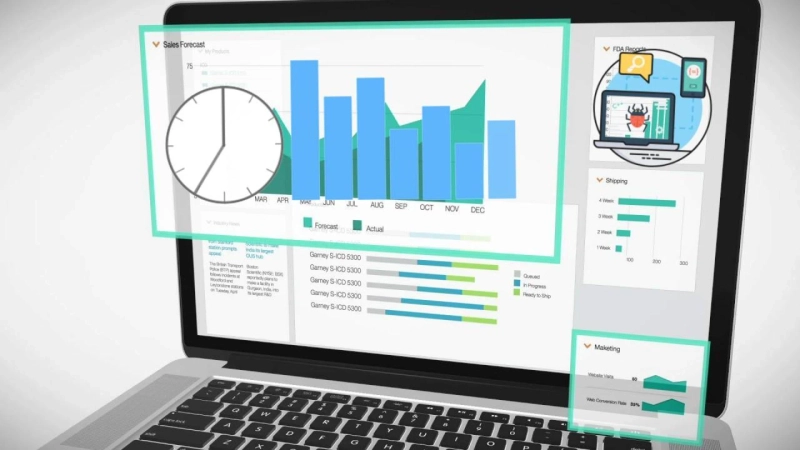What is Big Data Analytics?
The technique of making use of massive data groups to discover unseen designs, market inclinations, client choices, and the like are known as big data analysis. With the help of big data solutions Australia, company leaders have the tools they require to extract the business value through data and creating business choices that are based on solid logic.
While big data plays a crucial part in transforming the online sector, unique technologies and information have brought about an increase in eCommerce sector competition. Online companies may collect information from several sources such as web server logs, geolocation facilities, uncontrolled shopping carts, transaction receipts, social media movement, sensors linked to the IoT (internet of things), etc. Some information may be quite overwhelming, and often it happens in enormous amounts. While using big data, e-commerce businesses can get useful and actionable insights that may help them acquire and keep consumers, as well as boost profits.
In eCommerce, big data support company owners in understanding consumers effectively, but it also helps them forecast market tendencies and improves income.
E-commerce has experienced something unheard of during 90 days at the height of the COVID-19 outbreak. And with the online shopping industry increasing in popularity, an ever-increasing quantity of data is created, which drives additional industry expansion. Programmatic and contextual advertising, a new trend in this market, takes the use of data sets to determine the people to whom advertising should be directed.
In reality, big data is still an abstraction for many Internet company owners. Although they know it exists, have heard that it is valuable, and believe it may be helpful, they are unaware of how to create it relevant to their firm.
To get an edge in e-commerce, obtaining customer information is beneficial, but evaluating which data that sets e-commerce firms apart. Small industries with the help of big data analytics to support e-commerce enterprises might get a deeper understanding of their consumers' buying habits within the background of industry tendencies. In return, such businesses concentrate the marketing efforts on certain consumer segments, develop new goods that match client wants, and make sure that personnel offers the quality of customer care they have come to expect.
Beginning with small-scale use of big data is the greatest method to jump-start your big data use. Data analytics might provide a lot of benefits to the eCommerce market, so let's go through them in detail.
Here is a brief step-by-step guide have a look!
1. Customised user experience
Personalization in the competitive e-commerce environment cannot be overlooked; rather, it is the process of developing your own e-commerce company that sets you apart. In almost every job, one must be well-versed in the technical side of things.
86% of consumers feel that customization is critical in that they decide on buying.
When (87%) stated that the personalized shopping experience delivered online typically motivates customers to buy bigger items at a higher price, this may indicate that the offering of personalized merchandise is directly influencing customer shopping habits.
Big Data is an excellent tool for helping us get a more accurate picture of our consumers along with their habits, demographics, and behaviors. This information allows us to better tailor client experiences.
2. Supply Administration and Logistics
If internet shops have such difficulty in expanding their goods, then how do brick-and-mortar stores go about expanding their supply?
It is more difficult to sell a product that you did not order enough of since the customer may have lost out on the opportunity to make a deal and that means incurring more costs to store all the things and taking additional risks of not being able to sell everything.
An accurate study would assist retailers and manufacturers identify all the supply chain concerns, allowing them to leverage big data to their advantage.
3. Drastically reduced pricing
Clients respect generous offerings. Internet e-commerce enterprises are beginning to use Big Data to locate the best possible pricing for items to increase online sales. Individuals who have shown strong allegiance to any firm over an extended time may be able to purchase a product ahead of other buyers, and their shipping costs may differ depending on their residence and job location.
For as long as corporations have been, they have used conventional pricing tactics, which is known as costing-plus markup. Nevertheless, while studying millions or even billions of online items, it is never effective to make use of pricing techniques based on simple cost calculations.
A wealth of information today means businesses can get a bird's-eye opinion of their players' assessing and keep up to date on this information in actual time. Removing product information from online websites is a feature of Big Information, and adjusting pricing according to competition amount is another feature.
Final words
Big Data online has the power to be a huge benefit to a company's chance of surviving in the online era.
The use of SaaS-based services makes it possible for company owners to have access to all the essential tools needed to do business right from beginning to end, including gathering on-site data for A/B testing and all UX trials.
We can keep our company safe from the dangers of big data by keeping our operations inside the circle of expertise in which we can benefit from it as our big data strategy proves itself to be a great instrument for business development.


